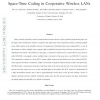Free Online Productivity Tools
i2Speak
i2Symbol
i2OCR
iTex2Img
iWeb2Print
iWeb2Shot
i2Type
iPdf2Split
iPdf2Merge
i2Bopomofo
i2Arabic
i2Style
i2Image
i2PDF
iLatex2Rtf
Sci2ools
159
click to vote
CORR
2011
Springer
2011
Springer
STiCMAC: A MAC Protocol for Robust Space-Time Coding in Cooperative Wireless LANs
Relay-assisted cooperative wireless communication has been shown to have significant performance gains over the legacy direct transmission scheme. Compared with single relay based cooperation schemes, utilizing multiple relays further improves the reliability and rate of transmissions. Distributed space-time coding (DSTC), as one of the schemes to utilize multiple relays, requires tight coordination between relays and does not perform well in a distributed environment with mobility. In this paper, a cooperative medium access control (MAC) layer protocol, called STiCMAC, is designed to allow multiple relays to transmit at the same time in an IEEE 802.11 network. The transmission is based on a novel DSTC scheme called randomized distributed space-time coding (R-DSTC), which requires minimum coordination. Unlike conventional cooperation schemes that pick nodes with good links, STiCMAC picks a transmission mode that could most improve the end-to-end data rate. Any station that correctly ...
| Added | 19 Aug 2011 |
| Updated | 19 Aug 2011 |
| Type | Journal |
| Year | 2011 |
| Where | CORR |
| Authors | Pei Liu, Chun Nie, Thanasis Korakis, Elza Erkip, Shivendra S. Panwar, Francesco Verde, Anna Scaglione |
Comments (0)

